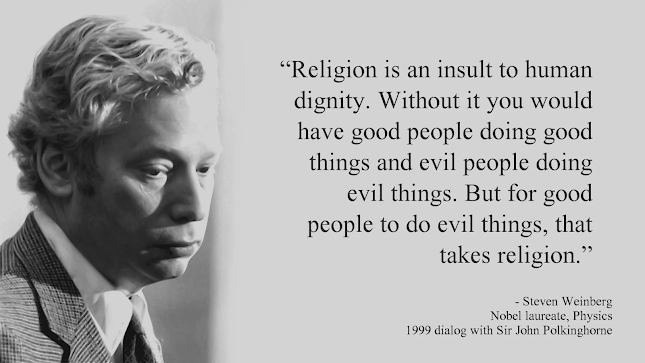"Christians Don't ..."
Recently,
a Christian said to me "Hi James! Christians don't do acts of kindness because we are being forced to do it. We do it because we love people." --- Ok.[Let's unpack this] "Christians don't do X. (Instead) Christian do Y" . -- Now, you'd probably expect me to quote an entire sentence and then reply to that whole thought. Normally, that would be fair. However, Let's get this out of the way first. -- The implication of "Christians don't X" is this: "No Christian do X". Likewise, the implications of "Christians do Y" is this: "All Christians do Y". This is true both grammatically and in terms of how people just normally casually speak. However, if we really think about it, we realize there isn't anything we could follow that with which has even a chance of being true. Why not? Because there literally isn't anything which is: a.) specific to Christians and yet b.) which all Christians do (or don't do). This is the main reason why no single person who identifies as a "Christian" can speak for the rest. Meanwhile, the general idea of anyone being part of a larger whole comprised of *all people whom accept any conceptualization of a "Jesus Christ"* is either: a.) true (that larger whole exists) or b.) false (that larger whole doesn't exist). If it doesn't exist, then someone automatically can't be part of something that doesn't exist. In that case, you also can't make any factual statements about something which factually isn't a thing. And yet, ... if it does exist, then every self-identified-Christian is automatically a part of it. However, even then, nobody could speak for the larger whole; - because there's still nothing meaningful that they all think (or don't think), feel (or don't feel), etc.. This is the very same reason that atheists shouldn't be saying that all Christians think the same. It's not reasonable when anyone makes such statements; no matter if the generalization is positive or negative. And yet, there's a far more pressing issue here that warrants our attention. If it DOES exist, then every Christian is automatically complicit in every horrible evil any-part of that larger structure does; because of all the ways they empower the larger whole. This, btw, is the main reason that all Christian missionary/outreach is a morally wrong thing to do; if our moral compass is defined by helping others while not grievously hurting anyone. The billions of people in our world who are personally and grievously impacted by the evils of the larger whole of "Christianity" ... matter to me. If they matter to you too, then you shouldn't be endorsing that larger whole of Christianity; not in any way. With that in mind, I'd like to point out that someone can endorse any conceptualization of "Jesus" without endorsing the larger whole of "Christianity". It's easy. They can just say "Jesus Christ is real, he's great, and he (whatever else they want to say about him). But then add the disclaimer (Seriously. Everyone who endorses a "Jesus" should always, always, always add this, or similar, disclaimer): "But I'm not endorsing the religion of Christianity, nor any specific other Christians. I don't identify as part of that religion, because they do a lot of harm and they collectively misrepresent him. I merely identify as an individual who believes x-things about Jesus, and who believes that HE only helps people and never harms anyone". And yet, if the only way to HAVE (whichever) Jesus is to have Christianity, then Jesus becomes automatically debunked (in addition to all the other ways he has been debunked); because then Jesus (the idea of Jesus) becomes automatically a bad thing to have by extension of him being inseparable from Christianity. --- As for the rest of the quote (the one I'm here replying to), ... I'll make time for that soon. Until then, I hope you are well. -Warmest regards --------- Update. I am now making time to reply to the rest of that quote. For context, this is the statement/post of mine which that Christian was directly replying to: There is a famous story told in Chassidic literature that addresses this very question. The Master teaches the student that God created everything in the world to be appreciated, since everything is here to teach us a lesson. One clever student asks “What lesson can we learn from atheists? Why did God create them?” The Master responds “God created atheists to teach us the most important lesson of them all – the lesson of true compassion. You see, when an atheist performs an act of charity, visits someone who is sick, helps someone in need, and cares for the world,... he is not doing so because of some religious teaching. He does not believe that god commanded him to perform this act. In fact, he does not believe in God at all; - so his acts are based on an inner sense of morality. And look at the kindness he can bestow upon others simply because he feels it to be right.” “This means,” the Master continued “that when someone reaches out to you for help, you should never say ‘I pray that God will help you.’ Instead for the moment, you should become an atheist, imagine that there is no God who can help, and say 'I will help you.’” ----- When she read those words, she felt like the implications of this included the accusations that: 1. All Christians are coerced by their religious beliefs about "God" to do kind deeds.
and 2. They wouldn't otherwise do good/kind deeds. So she rushed in to refute those charges.
However, ...
No such charges were made about all Christians.
SOME religious persons ARE just trying to impress, serve, or otherwise satisfy the interests and commands of their conceptualized "God". And if ANY religion's texts/writers did not WANT for their followers to have THOSE reasons (either frequent, primary, or sole reasons) as reasons to do kind deeds,
then: They should not have said a lot of the things they've said.
Bible writers, for example, certainly did go out of their way to pressure followers into a sense of obligation to good and bad deeds; - as a way to impress their "God", and as a way to serve the interests of their respective tribes.
They never said "only do good for these reasons".
But neither did they say "only do good deeds out of a sense of compassion for others". - Nor should they have said such a thing; because people with a heart such as that ... would do (whichever) good deeds regardless.
So then it would be like telling a dog to go chase a cat or to wag his tail.
If he's so inclined, that's what he'll do regardless.
And if he's not, then ...
In that case, incentivized training would be the only way to elicit desired behaviors. People are the same way.
Bible writers realized that. So they tried to incentive desired behaviors; by creating an abusively Narcissistic Super-Parent to please;
trying to get people to WANT to please "Him" (which was really just a matter of pleasing them); but then adding "or else".
-The STICK; for whoever the Carrot doesn't work on.
As I've tried to explain before, ...
[Integrity is doing the right thing when no one is watching; even when it may work to your disadvantage] Christian texts and culture have made every effort to ROB YOU of that opportunity. They'd have you NEVER outgrow the need for a Super-Parent to be the sole or primary reason for your every choice in life; - with such admonitions as "seek first the kingdom", "all for His glory", and countless iterations of "or else". If, despite all that, any given Christian habitually does good deeds for actually-good reasons (as some do), ... then KUDOS. But just realize this.
Both a good heart and an autonomous mind lead naturally away from religion; -if those are allowed to flourish beyond the limits which such religions attempt to impose. Meanwhile, just as (she) evidently realized, ... it simply IS more morally impressive
and more personally meaningful/touching when a person is kind because they personally care; and not (at all) because of the though that "this is what my God wants me to do". So then, even if you are not an atheist, strive at least to be like an atheist in this way. That was the actual point of the story. And so, if any individual Theist already is striving to be like an atheist when it comes to this, then great.





Comments
Post a Comment